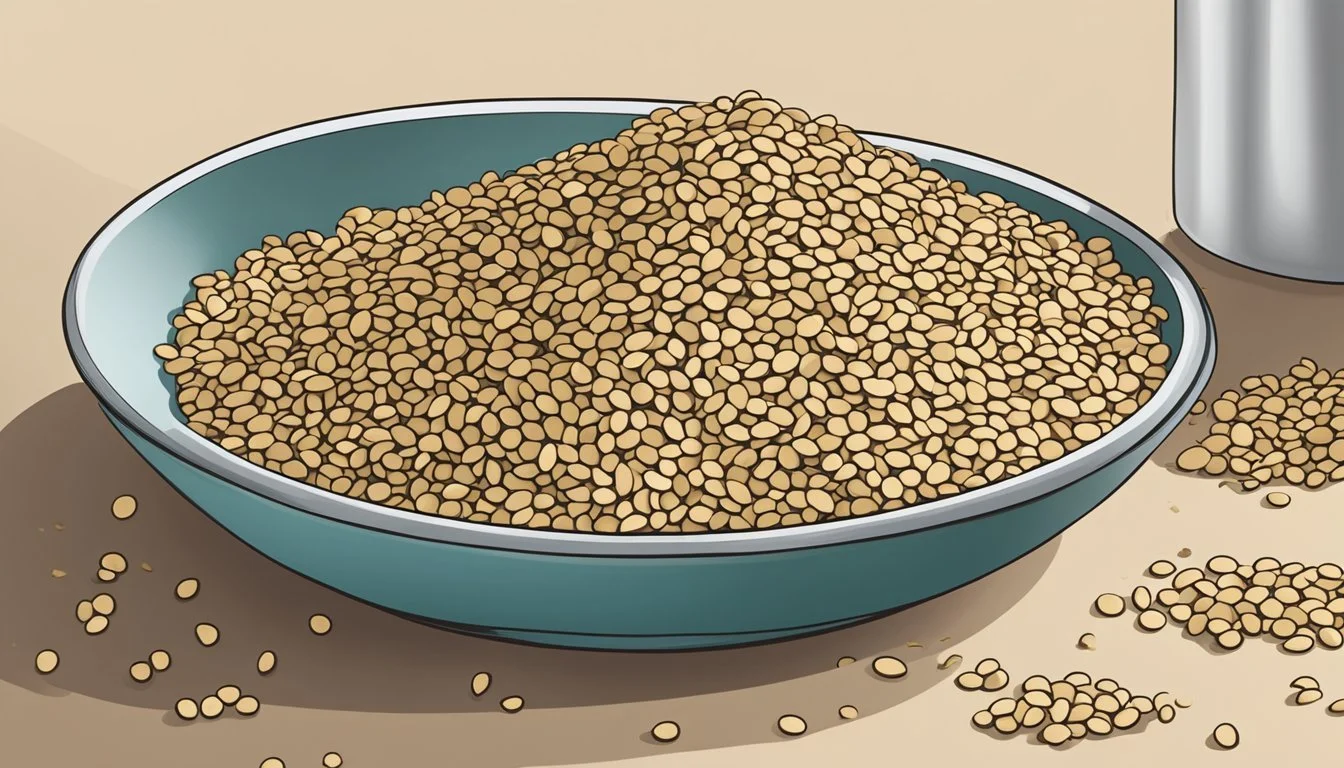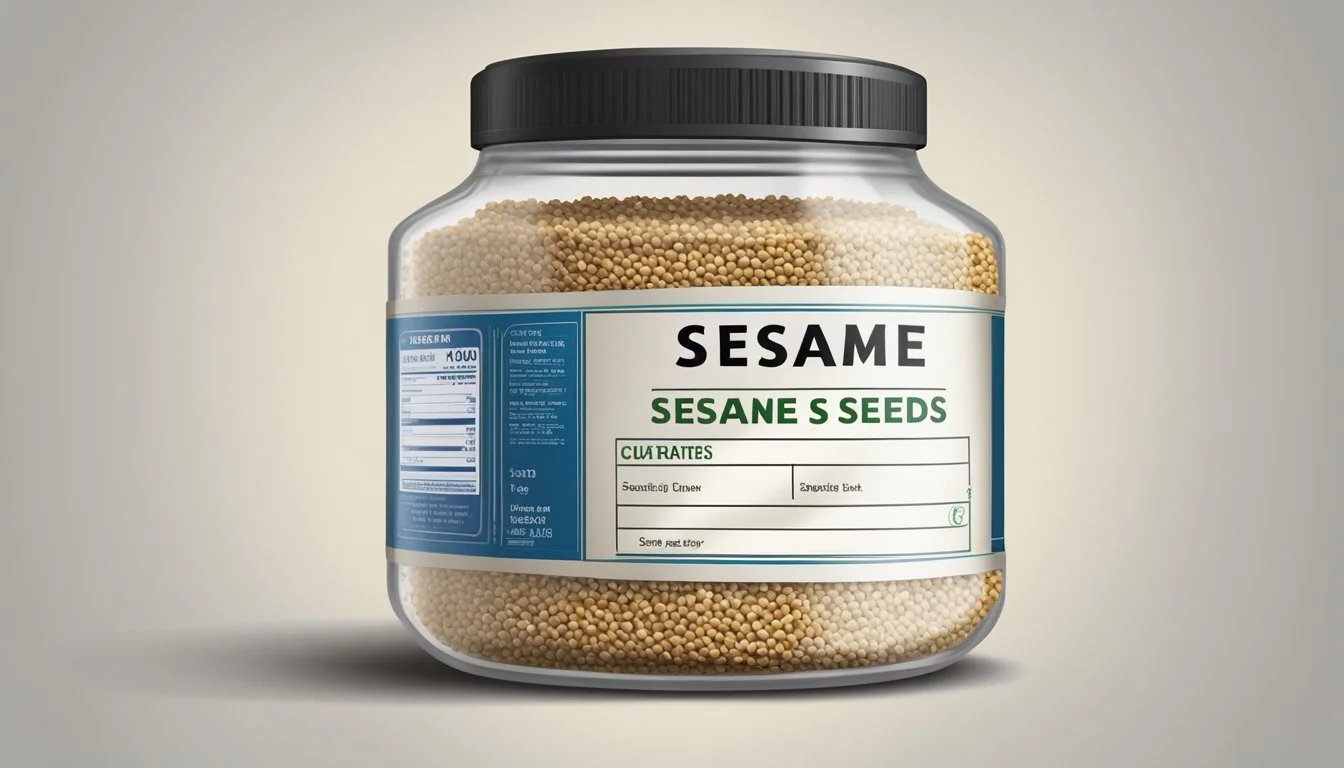Do Sesame Seeds Expire?
Understanding Shelf Life and Freshness
Sesame seeds are a staple in many kitchens, treasured for their versatility and nutritious benefits. Yes, sesame seeds can expire, but their shelf life largely depends on how they are stored and processed. Whole sesame seeds, when stored properly, can remain fresh for up to two years, providing they are kept away from light, heat, and moisture. Ground sesame powder, on the other hand, tends to have a shorter shelf life, lasting around six months.
Proper storage is crucial in extending the shelf life of sesame seeds. Airtight containers in cool, dark places are ideal to prevent the seeds from going rancid. It's also important to note that sensory cues like an off smell or taste can indicate that the sesame seeds have gone bad, even if the packaging indicates a longer expiration date.
Sesame seeds come in various forms, including raw, roasted, hulled, and unhulled, each with slightly different storage requirements and longevity. Understanding these differences can help in making the most of this nutritious ingredient, ensuring it remains a valuable addition to any recipe.
Understanding Sesame Seeds
Sesame seeds are small, nutrient-rich seeds that boast a range of health benefits. They come in different varieties and forms, each with its own unique characteristics.
Characteristics of Sesame Seeds
Sesame seeds are tiny, oval-shaped seeds with a delicate and nutty flavor. They are rich in natural oils, which contribute to their nutty flavor and nutritional value. These seeds are packed with healthy fats, such as omega-6 fatty acids, and contain significant amounts of protein, iron, calcium, magnesium, and fiber.
Raw sesame seeds can be white, brown, or black, with each color offering slightly different flavors and levels of antioxidants. In addition to their taste and color, sesame seeds are prized for their high content of vitamins and minerals, including vitamin B, vitamin E, zinc, and phosphorus. These nutrients make sesame seeds an excellent addition to a balanced diet.
Types of Sesame Seeds
There are several types of sesame seeds, each with its own uses and benefits. Raw sesame seeds are often used in baking and cooking for their mild flavor. These seeds can also be ground into a paste known as tahini.
Toasted sesame seeds have a deeper, more pronounced flavor due to the roasting process, making them ideal for sprinkling on salads, stir-fries, and other dishes.
Black sesame seeds contain higher levels of antioxidants compared to white and brown varieties. They are often used in traditional Asian dishes and desserts for their unique taste and nutritional benefits.
Hulled vs. unhulled: Hulled sesame seeds have their outer shell removed, resulting in a lighter color and more delicate texture. Unhulled seeds retain their shell, providing additional fiber and a slightly crunchier texture.
Storage Fundamentals
Proper storage ensures sesame seeds retain their freshness and nutritional value. Various factors such as storage conditions and packaging significantly affect their shelf life.
Proper Storage of Sesame Seeds
Sesame seeds should be kept in an airtight container. This prevents exposure to moisture and air, which can lead to spoilage. Store the container in a cool, dry place like a pantry.
Avoid placing them in direct sunlight, as this can deteriorate their quality. If longer storage is needed, sesame seeds can be kept in the refrigerator or freezer. This prolongs freshness up to six months.
Using a freezer bag for freezing is ideal, ensuring an additional layer of protection. Always label and date the storage containers to keep track of their use-by dates.
Factors Affecting Sesame Seed Shelf Life
Several factors influence how long sesame seeds last. Storage conditions play a crucial role. Exposure to light, heat, and moisture can significantly reduce shelf life. It's important to avoid the refrigerator unless necessary, as moisture can accumulate and affect quality.
The type of packaging also impacts longevity. Tightly sealed, airtight containers are preferred over open or loosely sealed ones. Sesame seeds in their raw form tend to last longer than those that are roasted or blended, such as in tahini.
Proper attention to these factors ensures that sesame seeds remain fresh and maintain their flavor and nutritional profile for extended periods.
Indicators of Quality
Evaluating the quality of sesame seeds involves assessing various sensory attributes and looking for signs of spoilage. These indicators can help ensure the seeds are suitable for consumption.
Assessing Seed Quality
The aroma of sesame seeds is one of the first clues to their quality. Fresh sesame seeds have a mild, nutty smell. If the seeds smell bitter or sour, they may be rancid.
A taste test can also reveal much about their condition. Fresh seeds should have a nutty flavor; if they taste bitter or lack flavor, it suggests they are deteriorating.
Texture is another important factor. Fresh sesame seeds should be crunchy when bitten. If they are soft or rubbery, their quality has likely declined.
Signs of Spoilage
Several visible signs indicate sesame seeds have gone bad. Mold is a clear indicator and should not be ignored. If mold appears on the seeds, they are spoiled.
Another sign of spoilage is a change in color. Sesame seeds typically appear white or light brown. Darkening may indicate they are past their prime.
Rancidity is a critical concern for sesame seeds. A noticeable off-putting odor or bitter taste points to this condition. Always check the date and evaluate with the sensory methods mentioned to determine if the seeds are still good to use.
Combining these steps ensures sesame seeds are fresh and safe for consumption.
Consumption Safety
When considering the consumption safety of sesame seeds, it's crucial to evaluate potential spoilage and contamination. Proper storage and recognizing signs of rancidity play significant roles in ensuring safe consumption.
Assessing Consumption Safety
Expired sesame seeds can sometimes be safe to eat if properly stored. Signs of spoilage include a rancid odor, off taste, or visible contamination. Fresh sesame seeds typically have a mild, nutty aroma, which changes when they spoil.
Health risks associated with consuming spoiled seeds range from minor digestive issues to more severe bacterial infections if contaminants are present.
Table of Spoilage Indicators:
Indicator Fresh Spoiled Smell Mild, nutty Rancid, sour Taste Neutral, nutty Bitter, unpleasant Texture Crisp, firm Soft, mushy
Proper assessment involves using senses to identify any spoilage signs. If in doubt, it is safer to discard the seeds to avoid potential health risks.
Preventing Contamination
Preventing contamination involves strict storage practices. Store sesame seeds in a cool, dark place, ideally in airtight containers to protect them from moisture and bacteria.
Steps to Prevent Contamination:
Use Airtight Containers: This keeps out moisture and contaminants.
Keep in Cool, Dry Place: A pantry away from direct sunlight is ideal.
Check Regularly: Inspect seeds periodically for any signs of spoilage such as mold or unusual odors.
Refrigeration can extend the freshness of sesame seeds and products like tahini. By managing storage conditions diligently, the risk of consuming contaminated or spoiled sesame seeds reduces significantly.
Shelf Life Information
Sesame seeds can last for various lengths of time depending on storage conditions and whether they are raw or roasted. Proper storage practices can help to prolong their freshness.
Determining Sesame Seeds' Shelf Life
The shelf life of sesame seeds varies based on several factors. Raw sesame seeds can last for one to three years if stored in a cool, dark place. If exposed to light or heat, their shelf life may be reduced.
Roasted sesame seeds typically have a shorter shelf life. They can remain fresh for three to six months when stored in the pantry. Refrigerating or freezing them can extend their freshness to about a year.
Always check sesame seeds for signs of spoilage, such as an off smell or taste, before use.
Extending Shelf Life
Proper storage of sesame seeds can significantly prolong their shelf life. Unopened packages should be kept in a cool, dry place away from light. Once opened, seeds should be transferred to an airtight container.
Freezing sesame seeds is an effective method to extend their freshness. Place them in an airtight container or a freezer bag, and they can last for up to six months.
Avoid storing sesame seeds in the refrigerator unless tightly sealed, as moisture can affect their quality. Proper storage techniques are crucial for maintaining the flavor and nutritional value of sesame seeds.
Practical Usage Tips
Sesame seeds are versatile and nutritious, offering a nutty flavor and enhancing a variety of dishes. To maximize their potential, it is essential to know how to incorporate them into recipes and how to purchase and store them properly.
Incorporating Sesame Seeds in Recipes
Sesame seeds add crunch and nutty flavor to sweet and savory dishes. Sprinkle them on salads, stir-fries, and noodles for a tasty garnish.
Use them in baking; add to bread, cookies, or muffins for enhanced texture.
Tahini, a popular paste made from blended sesame seeds, can be used in dips, dressings, and sauces. Despite its tendency to spoil quicker than whole seeds, it is an excellent addition when stored properly in the refrigerator.
Savory recipes often benefit from toasted sesame seeds, enhancing their flavor.
Sweet dishes, such as sesame bars or halva, showcase their versatility.
Purchasing and Testing Sesame Seeds
When buying sesame seeds, opt for airtight packaging to maintain freshness.
Well-packaged seeds should be free of moisture and look evenly colored. Hulled and unhulled seeds offer different nutritional values, so choose based on preference.
Test sesame seeds for freshness by checking their aroma. Fresh seeds emit a mild, nutty smell, while rancid ones smell off.
Store seeds in an airtight container at room temperature or in the refrigerator to extend their shelf life. Vacuum sealing can further prevent spoilage.
Freezing sesame seeds is also an option. They can last up to six months when stored properly in the freezer. Use these methods to ensure that sesame seeds remain fresh and flavorful.





